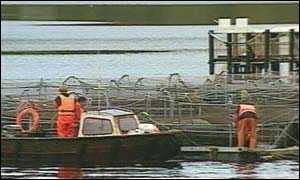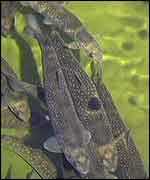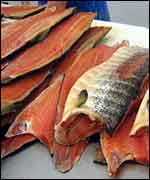|
Mr Russell added: "Our aim is to minimalise the burden of sea lice on farm salmon and wild fish, and we have to work positively together to do that. "We are doing that in this area."
Salmon farmers around the North Atlantic produced 4,783 tonnes in 1980, and 658,735 tonnes in 2000.
Sale ban
The Atlantic Salmon Federation, Greenpeace and the global environment campaign, WWF, are calling for "fish-farming free zones" to protect rivers and bays.
They also want commercial wild salmon fisheries on migratory feeding grounds in the Faroes and West Greenland to close.
Meanwhile, the Scottish Executive has banned the sale of salmon and sea trout caught by rod and line in an attempt to conserve wild fish stocks.
Deputy rural development minister Allan Wilson said the ban had "overwhelming" support from the individuals and organisations consulted.
"In many of our rivers, anglers are being encouraged to release salmon and sea trout they have caught.
"And increasing numbers of them are doing this.
"It is unacceptable that sport fishermen try to catch as many as possible so they can sell them," Deputy rural development minister Allan Wilson
A Scottish Executive spokesman said the research provided "further useful information about sea lice interactions which we will be considering".
It reinforces the need for an "area management" based approach and close co-operation between farmed and wild fishery interests, he added.
|


